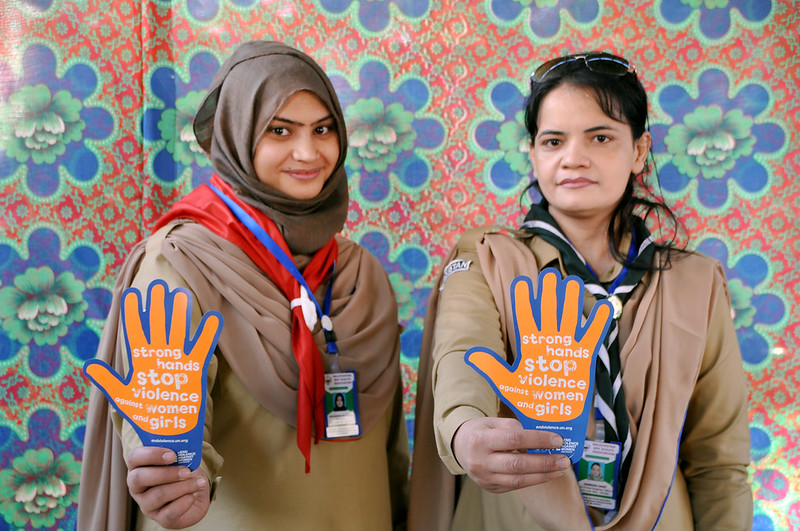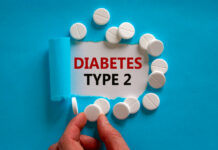A study in the Journal of Affective Disorders has established a connection between childhood trauma, stressful life events, and depression in Pakistani women. Furthermore, the authors highlight that conscientiousness, extraversion, and heightened perceived social support can serve as protective measures against the diagnosis of major depressive disorder (MDD).
The study suggests that both MDD and childhood trauma are prevalent among Pakistani women. The authors state:
“MDD and a history of childhood trauma were highly prevalent in Pakistani women attending general medical clinics. Interventions to prevent childhood trauma and enhance social support for women could enhance public mental health in LMICs like Pakistan.”

Balochistan Girl Scouts Nosheen and Ambreen say, ‘Strong hands stop violence against women and girls.’
Photo: UN Women/Henriette Bjoerge
The study investigated the correlation between MDD, childhood trauma, and personality traits among Pakistani women. To this end, the researchers engaged 455 women from general outpatient medical clinics in Pakistan.
To qualify for the study, participants had to be between 18 and 65 and capable of giving informed consent. Women were excluded if they had pronounced learning disabilities, a diagnosis on the schizophrenia spectrum, psychotic symptoms, substance abuse disorders, severe chronic medical conditions, or prior head injuries resulting in loss of consciousness or neurological complications.
Participants underwent a structured clinical interview for DSM-IV conditions. The self-report questionnaire (SRQ-20) was employed to gauge psychological distress, and the childhood trauma questionnaire (CTQ) was used to evaluate childhood trauma. Personality traits were assessed using the NEO personality inventory revised (NEO PI-R). Furthermore, participants completed the life event questionnaire (LEQ) to determine stressful life events and the multidimensional scale of perceived social support (MSPSS) to assess social support levels.
Of the 455 participants, 246 (54%) tested positive for MDD. The average age for those testing positive was 36.27, while the average age for those without depression was 33.24. Women diagnosed with MDD had a higher likelihood of being married (74%), separated or divorced (8.1%), or widowed (8.5%) compared to those not diagnosed.
Women with a depression diagnosis reported greater childhood trauma across all categories. For instance, 5.7% of the depressed group reported emotional abuse during childhood, as opposed to 4.3% of the non-depressed group.
76.8% of depressed women experienced emotional neglect compared to 65.2% of non-depressed women. Likewise, the numbers for physical abuse, physical neglect, and sexual abuse in childhood were higher for those diagnosed with MDD.
Depressed women perceived notably less social support across all categories (from friends, family, and others) than their non-depressed peers. Women diagnosed with MDD also indicated a higher number of stressful life events.
The study found that women with high scores in conscientiousness and extraversion were less likely to test positive for MDD. Separated or divorced women had a threefold increased risk of depression compared to their married or single counterparts, making them the subgroup with the highest depression likelihood.
The researchers noted that a 10-unit difference in the MSPSS equated to a 30% lower chance of depression. A 10-unit rise in extraversion and conscientiousness scores also diminished depression risk by around 30%.
Also, each single-unit increase in the stressful life events score meant a 20% higher chance of testing positive for depression. A 10-unit surge in the childhood trauma score indicated a 45% increased likelihood of an MDD diagnosis.
The study recognized two fundamental limitations: the reliance on participants’ memory, which could lead to data inaccuracies, and the fact that data on participants’ current physical health was not collected, excluding potential influences on measurements. Moreover, since the data exclusively concerns Pakistani women, its applicability to other groups is constrained. The authors summarize:
“The high prevalence of childhood trauma and MDD in Pakistani women attending general medical clinics underscores the importance of an integrated approach to identifying and treating depressive symptoms in LMIC settings. Such strategies might elevate both physical and mental health outcomes for female patients.”
Prior studies have indicated that traumatic life events, rather than genetic factors or the discredited chemical imbalance theory, are primary drivers of depression. Research has also shown that childhood abuse makes individuals less resilient to depression.
There has been debate regarding the ethics and effectiveness of introducing Western psychiatric notions, like depression, globally. The universal applicability of the Western conception of depression is questionable, potentially compromising the validity of global studies on its prevalence and treatment. Some scholars argue that imposing Western psychiatric concepts on non-Western cultures represents a form of colonialism, undermining indigenous understandings of mental health.
****
Husain, M. I., Umer, M., Chaudhry, I. B., Husain, M. O., Rahman, R., Shakoor, S., Khaliq, A., Ali, W. M., Zaheer, J., Bassett, P., Mulsant, B. H., Chaudhry, N., & Husain, N. (2021). Relationship between childhood trauma, personality, social support and depression in women attending general medical clinics in a low and middle-income country. Journal of Affective Disorders, 292, 526–533. https://doi.org/10.1016/j.jad.2021.06.010 (Link)















So there are 6 broad meassures used: DSM, SRQ-20, CTQ, NEO PI-R, LEQ and MSPSS. That sounds like a fishing trip even if they kind of try to concatenate the tools. The more variables the more correlations just by chance, possibly even probably spurious.
And on the aggregate it seems pakistani women experience violence or neglet in childhood above 75-80%!.
And to put a context how important I think those risk factors are for a depression of MDD: A 30% DECREASE in risk of depression translates to a frequency of MDD in pakistani women going from 54% to around 38%, not that big impact even if it might affect a lot of women. A 45% decrease in risk to around a frequency of 30%. If I am not miscalculating and/or missunderstanding.
So even if those risk factors were eliminated as stated would take down prevalence of MDD among pakistani women to around 30%, maybe to a lower level if all were prevented, and if in fact they are independent from each other.
And to my mind even if it supports a causal role for bad experiences in childhood for an adult diagnosis of MDD, the increase in the proportion of women having a risk factor is not that big as reviewed here. Maybe because of false diagnosis or overdiagnosis or because bad experiences are so common. Or both, but it does question how powerfully causal those experiences are to be diagnosed with MDD, not that great to my mind.
Even if it does cause harm and suffering, which to me might be better addressed at the experience not the diagnosis, which already is questionable.
As a funny note, in self administered online tests for extraversion I scored somewhat high, despite my acquantainces, friends, partners might most likely call me quiet, timid, even shy!. So much for personality traits for me!. Yipee!. They are untrained in the dark arts, muahahahaha.
Report comment